Deleting Items from the Inventory Viewer
You can delete multiple items at a time by using the Inventory Viewer. Read the three sections below in the order presented. The first and second sections explain what you should do before attempting to delete items. The third section is the actual procedure for deleting items.
Before You Delete Items
Deleting an item can affect sales history and other information. You should not delete an item until after running year-end reports. If you delete an item prior to year-end, the sales history information reported by other inventory reports (such as Reports RIV, RIS, RSH, RPH, RIH, and RPA) will be inaccurate. Prior to deleting an item, you must check other functions to see if that item exists. If the item does exist, you must first delete the SKU from that function before you delete the SKU from Inventory Maintenance. Check the following functions (from Network Access or from the Inventory Maintenance window):
-
IAD Inventory Adjustment
-
FIL Flexible Inventory Load
-
MPO Modify Purchase Order
-
PIP Physical Inventory Posting
-
QPIP Quick Physical Inventory Posting
-
MPH Modify Physical Inventory Shrinkage History
-
POS Transactions (any saved POS transactions, such as orders, estimates, bids, special orders, and transfers)
-
Item Price Changes (Go To menu)
-
Alternate Part Number (Vendor tab)
-
Modify Item Promotions (Go To menu)
-
Modify Kits (Go To menu)
-
Modify Tally Cross Reference (Go To menu)
Required Options and Security
The options and security bits listed below affect your ability to delete items from the Inventory Viewer. After reading the information below, you may want to review these settings in Options Configuration and Security Maintenance before attempting to delete items in the Inventory Viewer.
- The new option 8617 "Allow Delete in Inventory Viewer?" must be set to Yes to enable the Delete feature in the Inventory Viewer.
- The new security bit 777 "Ability to Delete in Inventory Viewer?" must be set to Yes for the signed-on user to see the delete button in the Inventory Viewer, even if option 8617 is set to Yes.
- The existing security bit 224 "Delete inventory items" must be set to Yes for the signed-on user to be able to delete in the Inventory Viewer.
- The existing option 3037 "Allow deleting items in Inventory Maintenance if QOH is not zero" is checked during the delete; if this bit is set to No, you cannot delete items that have a quantity on hand.
- The existing option 3038 "Give warning if deleting an item that has any quantity > 0" is also checked during a delete, and if set to Yes, the system may deliver a warning depending on the item’s quantity on hand.
- If you have a multi-store system, and you want to delete items across stores, you must have the following existing security bits set to Yes:
-
- Security Bit 6 "View data in all stores"
- Security Bit 12 "Add/Change/Delete data in all stores"
Deleting Items from the Inventory Viewer
- From the Eagle Browser, click Inventory Menu, then click Inventory Maintenance. From Inventory Maintenance, click Viewer.

The Delete button only displays in the Inventory Viewer if you have launched the viewer from Inventory Maintenance.
- Look up the desired range of items from which you will be deleting.
- Multistore: In the Store field above the grid, indicate the store(s) from which you want to delete items, or select All Stores.
- If checkboxes aren't already displayed in the far left column of the grid, right click on any column heading and select Checkboxes.
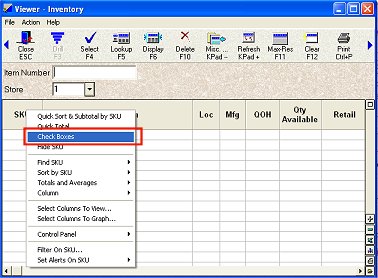
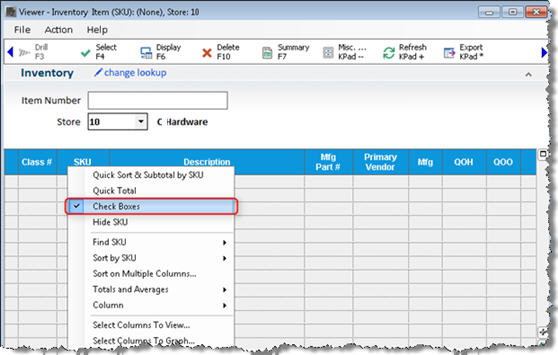
-
Click the checkbox next to the items you want to delete. (Note: you can also use the down-arrow key and spacebar to place or remove checkmarks)
- Click Delete.
- Multistore: If prompted, select Yes to delete records in all stores, or select No to delete records in just the store specified in the Store field of the Inventory Viewer. (Note: the prompt does not display if you selected All Stores or a Store Group in step 3, or if you don't have security bits 6 and 12 to delete items from all stores.)

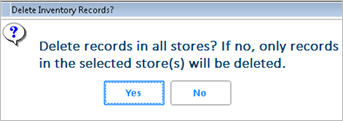
- To proceed with the deletion, click Yes in the warning box.

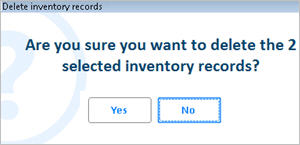
- To proceed with the deletion, click Yes in the second warning box.
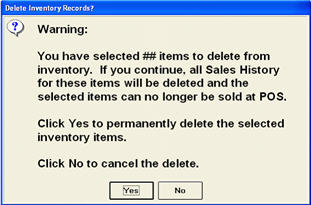
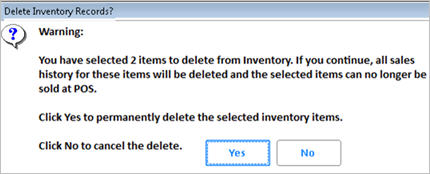

The Inventory Maintenance Changes Viewer stores a record of every change made in Eagle for Windows Inventory Maintenance, including deleted items.
![]()








![]()